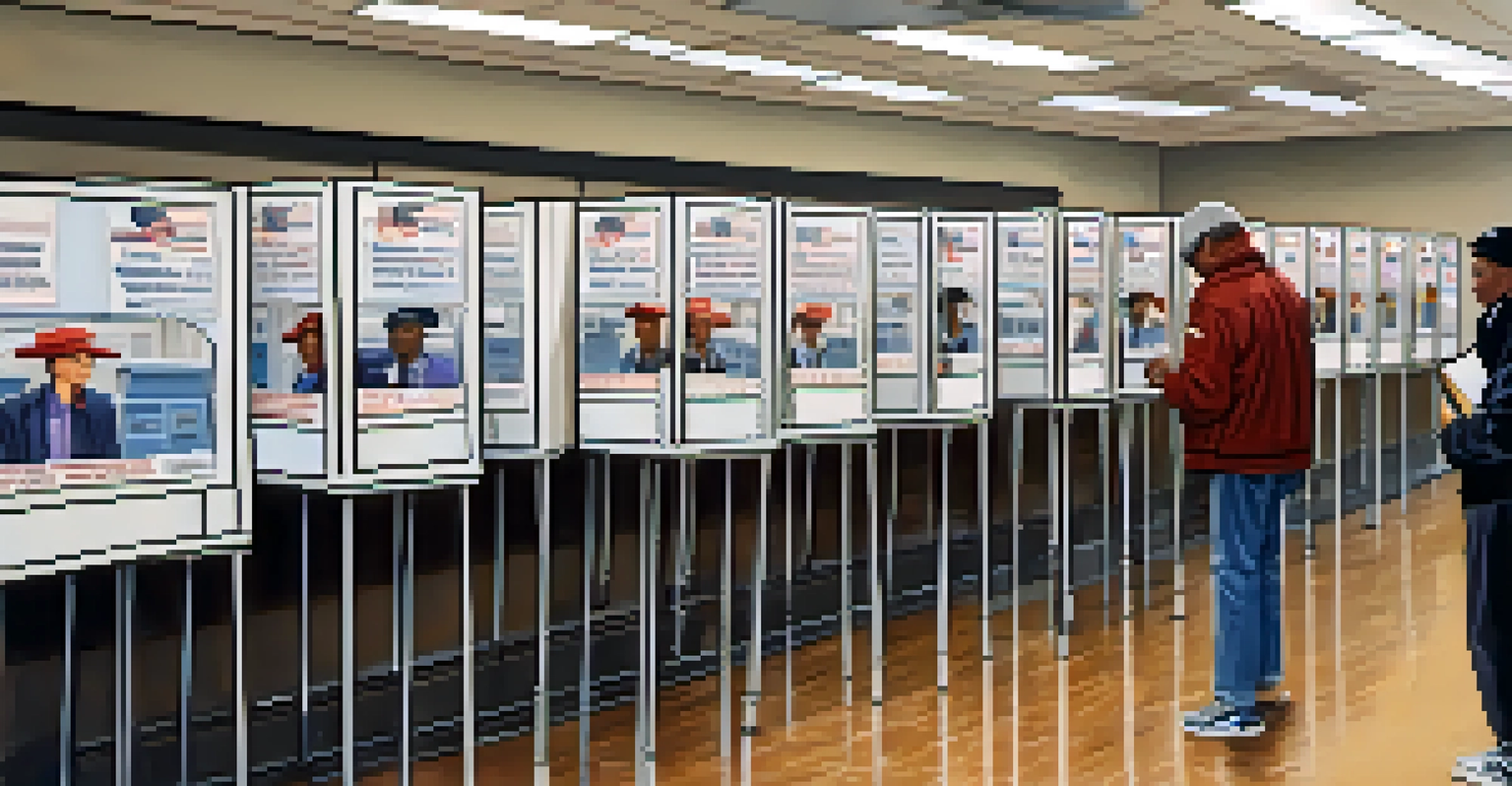North Carolina Elections: Trends and Implications for Voters

Understanding the Political Landscape in North Carolina
North Carolina has long been a battleground state, with political dynamics shifting over the years. The state has experienced a growing population and increased diversity, leading to a more complex electorate. This changing landscape influences the strategies of both major parties as they seek to appeal to a wider range of voters.
In a democracy, the highest office is the office of citizen.
The 2022 midterms highlighted these shifts, with both Democrats and Republicans working hard to mobilize their bases. Issues like education, healthcare, and economic opportunity resonated with voters across the state. Understanding these trends helps to anticipate future election outcomes and voter behavior.
As North Carolina heads into the next election cycle, keeping an eye on local demographics and emerging issues will be crucial. Voter engagement strategies will need to adapt to reflect the evolving needs and priorities of the electorate.
Recent Voting Trends and Patterns in North Carolina
Recent elections in North Carolina have shown a notable trend towards increased voter turnout. Engaging younger voters and minorities has become a focal point for both parties, recognizing their potential influence on election results. In fact, the 2020 presidential election saw one of the highest turnouts in the state's history.

Another significant trend is the rise of early voting and mail-in ballots, which offer greater accessibility for voters. This shift has changed the dynamics of election campaigns, with candidates needing to reach voters well before Election Day. The convenience of these options has encouraged more citizens to participate in the electoral process.
Evolving Political Landscape
North Carolina's changing demographics and voter engagement strategies are crucial for both major parties as they prepare for upcoming elections.
Understanding these voting patterns is essential for candidates and political strategists. It allows them to tailor their messages and outreach efforts to better connect with the electorate, ultimately impacting the success of their campaigns.
Impact of Redistricting on North Carolina Elections
Redistricting is a crucial factor that significantly impacts North Carolina elections. Every ten years, following the census, district boundaries are redrawn, which can alter the political landscape dramatically. In recent years, controversial redistricting processes have led to legal battles and accusations of gerrymandering.
Voting is not only our right—it is our power.
These changes can influence election outcomes by creating districts that favor one party over another. Voters in newly drawn districts may find themselves represented by candidates who do not align with their views. This situation raises questions about the fairness and transparency of the electoral process.
As redistricting continues to shape elections in North Carolina, it's vital for voters to stay informed about their district boundaries. Understanding who represents you and how those lines were drawn can empower voters to make more informed decisions in the voting booth.
Role of Voter ID Laws in North Carolina Elections
Voter ID laws in North Carolina have sparked significant debate and controversy. Supporters argue that these laws help prevent voter fraud, while opponents contend they disproportionately affect minority and low-income voters. The requirement for photo identification can create barriers for those who may not have easy access to ID.
In 2021, a federal court ruled that the state's voter ID law was discriminatory, highlighting the ongoing tensions around voter access. This ruling has implications for upcoming elections, as the law's future remains uncertain. Voters should be aware of the current regulations to ensure they can participate fully in the electoral process.
Impact of Redistricting
Redistricting significantly influences election outcomes, often leading to gerrymandering and complicating voters' representation.
The discussion around voter ID laws underscores the broader theme of voter accessibility in North Carolina. Ensuring that all eligible voters can cast their ballots is essential for a healthy democracy, and ongoing advocacy is necessary to achieve this goal.
Key Issues Shaping North Carolina Elections in 2023
As North Carolina approaches the 2023 elections, several key issues are at the forefront of voter concerns. Education funding, healthcare access, and economic recovery post-pandemic are all topics that candidates will need to address to resonate with voters. These issues are not only vital for individuals but can also influence the overall quality of life in communities across the state.
Additionally, debates surrounding environmental policies and infrastructure improvements are gaining traction. Voters are becoming increasingly aware of how these decisions impact their daily lives and the future of their communities. Candidates who prioritize these issues in their platforms may find greater success at the polls.
Engaging voters on these key issues is critical for both parties. By actively listening to constituents and addressing their concerns, candidates can build trust and foster a more informed electorate.
The Influence of Social Media on Voter Engagement
In recent years, social media has revolutionized the way candidates engage with voters in North Carolina. Platforms like Facebook, Twitter, and Instagram allow for direct communication and real-time interaction, making it easier for voters to connect with political figures. This shift has also changed how information is disseminated, leading to both positive and negative outcomes.
While social media can enhance voter engagement and mobilization efforts, it also opens the door to misinformation. False narratives can spread quickly, complicating the decision-making process for voters. Therefore, it's crucial for individuals to critically evaluate the information they encounter online.
Significance of Local Elections
Local elections are vital as they directly affect community policies and serve as a stepping stone for future political leaders.
As we move forward, understanding the role of social media in elections will be essential. Candidates who navigate this landscape effectively can leverage it to their advantage, while voters must remain vigilant and informed.
The Importance of Local Elections in North Carolina
While national elections often receive the most attention, local elections in North Carolina are equally important. Local officials make decisions that directly affect residents' lives, from school boards to city councils. Engaging in these elections allows voters to influence policies that matter most to their communities.
Furthermore, local elections serve as a training ground for future political leaders. Many candidates for higher office start their careers at the local level, gaining valuable experience and insights into the political process. Understanding this pipeline can help voters recognize the significance of their choices in local races.

Voter participation in local elections can shape the future of North Carolina. By staying informed and involved, citizens can ensure that their voices are heard and that their values are represented in local governance.